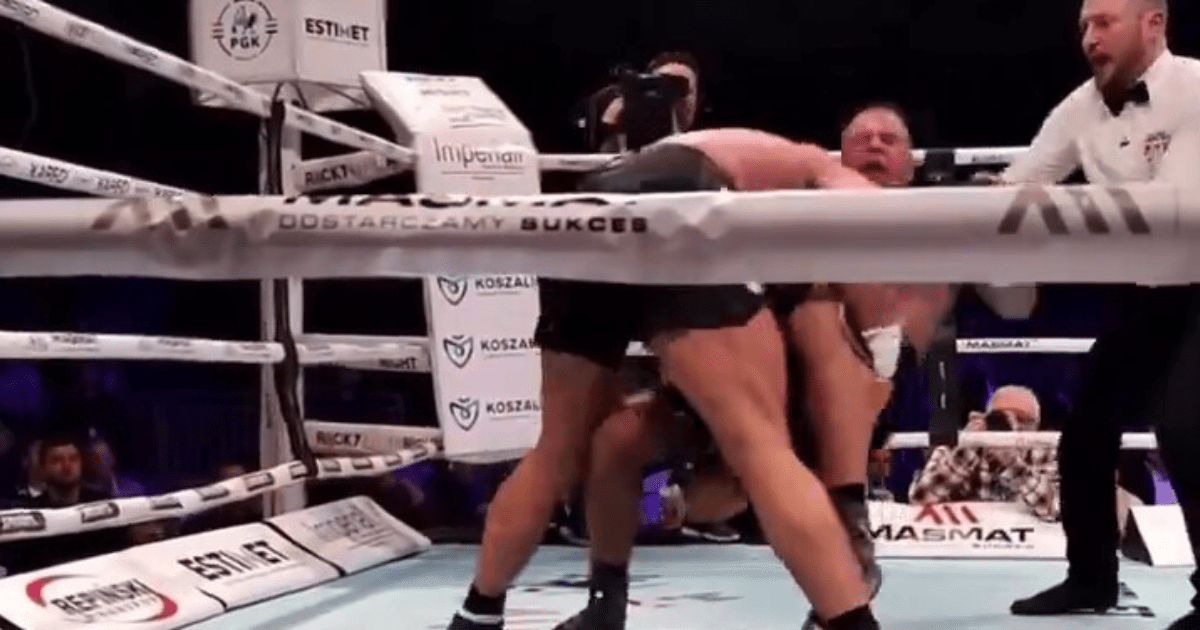Farcical Scenes Unfold in Crossover Bout
Fans were left bewildered as a crossover boxing bout turned into chaos when an MMA fighter seemingly "forgot" what sport he was competing in. The bizarre incident took place during a match between MMA ace Marcin Sianos and boxing prospect Artur Bizewski in Koszalin, Poland.
Disqualification and Outrage
During the second round of the fight, Sianos appeared to lose track of the rules after rocking his opponent and resorted to an MMA-style takedown, followed by ground strikes. This led to his disqualification, much to the fury of spectators who attempted to storm the ring and hurl objects at Sianos, who had to be escorted out by security.
Social Media Reaction
Footage of the incident quickly spread on social media, prompting a wave of humorous and critical comments. Even Sianos himself took to Instagram to address the unsportsmanlike behavior, expressing regret and offering to rematch Bizewski for charity, acknowledging his mistake and the impact it had on his sportsmanship.
Frequently Asked Questions
What equipment is necessary for a new professional boxer?
Essential equipment for anyone who wants to start in professional boxing includes boxing glove, hand wraps and mouthguard (for sparring). Also included are proper footwear. The use of a heavy, speed, or double-end bag is essential for technical workouts. Quality equipment is important for safety and durability. Subpar gear increases the risk of injury.
What should someone look for in a boxing coach or trainer?
When seeking a boxing coach or trainer, one should look for experience, a successful track record with other boxers, compatibility in coaching style, and a deep understanding of the sport’s technical and strategic aspects. A good trainer will also emphasize safety, conditioning, and personal growth. It is also important to find a boxing coach who can motivate you and communicate effectively.
What are the dangers of professional boxing?
Professional boxing is a contact sport and as such, it carries risks. There are acute injuries, including cuts, bruises and broken bones. Also, there may be chronic conditions, like concussions syndromes or neurological disorders, that can develop from repeated impacts. Proper training, safety equipment, and adherence to boxing regulations help mitigate risks, but they can never be fully eliminated. It is important to understand and accept these risks before you decide to box professionally.
What role do managers and promoters have in the professional career of a boxer?
Managers and promoters play pivotal roles in a boxer’s professional career. Managers manage the career of boxers, negotiate contracts, and take care of their business affairs. The managers also help the boxer to choose the best fights, and look after his interests. Promoters on the other hand focus on event planning, marketing of fights, attracting audience, and sponsor attention. This enhances a fighter’s public image and earning potential.
How important are mental toughness and professional boxing in the world of sport?
In professional boxing, mental toughness is just as important as physical fitness. The sport requires resilience, focus and the ability to handle stress, as well as the psychological fortitude needed to overcome adversity. Mental preparation involves stress management techniques and developing an aggressive mindset in order to overcome the challenges of the ring. A boxer without mental toughness may find it difficult to perform well under the extreme conditions of a professional competition.
How does one progress from amateur to professional boxing?
Transitioning from amateur to professional boxing entails a significant step up in competition, training intensity, and mental preparation. Amateur boxers must build a track record by participating in local and regional competitions. The key is to get a professional boxing certificate and work with managers and trainers that can guide you in your career and help secure professional bouts.
How long does it take to become an elite boxer?
The time to become professional boxer can differ greatly. It depends on the individual’s starting skill level, adaptability to the sport, and the quality of training received. It may take several years for a dedicated amateur athlete to reach the level of a professional. Some talents will develop faster than others.
Statistics
- Approximately 80% of professional boxers start their career in the amateur ranks before transitioning to the professional level.
- An analysis of boxing injuries suggests that 90% involve the head, neck, and face, emphasizing the importance of protective gear.
- Around 60% of professional boxers supplement their income with other activities or jobs, due to variability in fight earnings.
- Less than 10% of professional boxers are undefeated throughout their career, highlighting the sport’s competitive nature.
- Reports suggest that successful professional boxers can earn upwards of 50 times more than the median purse for entry-level professionals per fight.
- Nutrition experts emphasize that over 70% of a boxer’s diet should focus on carbohydrates and proteins for energy and recovery.
- Professional boxers typically train 4 to 6 hours per day, 5 to 6 days a week, depending on their fight schedule.
External Links
boxingforum24.com
precisionstriking.com
expertboxing.com
titleboxing.com
ibhof.com
boxingscene.com
proboxing-fans.com
How To
How to handle recovery after intense Boxing Training
Performance and progress are dependent on a quick recovery from intense boxing sessions. Use a cooldown routine to reduce muscle soreness after workouts. Include stretching and low intensity cardio. Nutrition is important immediately after training. A combination of carbohydrates and protein can help muscle recovery. It is important to replenish the fluids you lost while exercising. Sleep is vital for recovery. Aim for 7 to 9 hours of sleep per night. Regular foam rolling and massage can help reduce stiffness by supporting muscle recovery.

